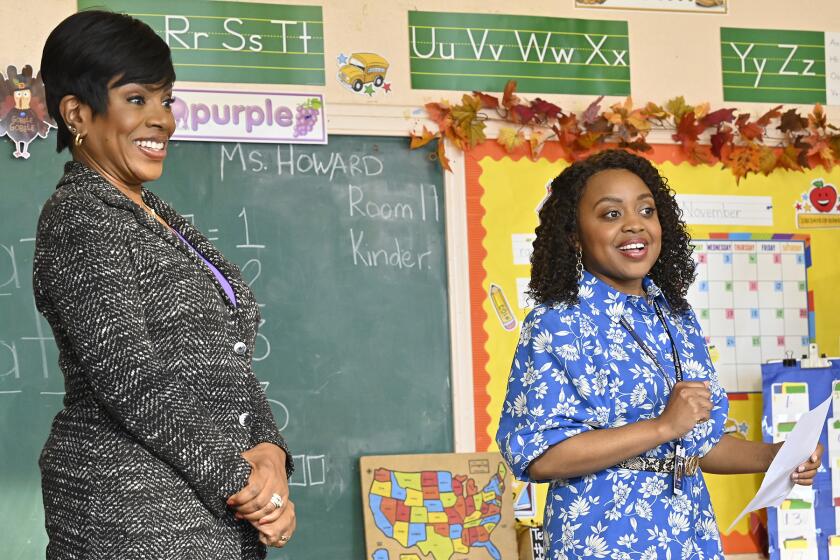Op-Ed: America’s approach to early childhood education is completely unsustainable

- Share via
Since the start of the COVID-19 pandemic, alarming attrition and turnover in the early education workforce has gotten even worse. Prior to the pandemic, turnover in the field was already as high as 30% annually. During the pandemic, the workforce shrank by an additional 10%.
The American Rescue Plan and other stimulus packages provided some support to stabilize the sector, including $39 billion for states to keep child-care programs open and to serve children from families with low incomes. But those measures are insufficient when early educators are still paid poverty wages — a wholly unsustainable and unjust approach to staffing an early education system.
According to the Center for the Study for Child Care Employment, the national average for an early educator’s hourly wage is $11.65 (for comparison, the other day I found a COVID rapid test for $9 — a real bargain). That’s a yearly salary of less than $25,000. One-time federal relief dollars alone can’t fix that degree of structural income inequality.
California’s preschool plan could put the state into a position of national leadership on early childhood learning.
A much more robust and lasting response is needed to provide appropriate compensation. The so-called Build Back Better Act stalled in Congress — declared “dead” earlier this month by Sen. Joe Manchin III of West Virginia — offers a viable solution to this problem that should be preserved, no matter what form the legislation next takes. The plan offered funding to states to build more sustainable, more equitable systems for educating young children.
For example, the pre-K portion of BBB would require that early educators with a bachelor’s degree be compensated on par with their K-12 counterparts. States could use funds to help educators attain bachelor’s degrees if they don’t already have them. The child-care portion of BBB would require educators to be paid a living wage — at least $15 an hour. Further, states could do what Washington, D.C., has done to lift educators out of poverty by providing direct payments of at least $10,000 to educators annually in addition to their base income.
Stabilizing this workforce is an absolute prerequisite for helping communities recover from COVID-19. The work that early educators do enables the rest of us to participate in economic life; without them, many parents, especially mothers, would be forced to leave the workforce to care for their children.
At the same time, early educators are critical to providing learning experiences that support the rapid brain development occurring in a child’s first years of life, from birth through kindergarten, including child care and prekindergarten. These educators also serve as a resource to families and connect the classroom with the community. They are often the first line of defense when kids and families experience trauma or hardship, which are increasingly common experiences because of COVID-19.
In this context, early educators are paid a wage that doesn’t come close to covering their worth, never mind the cost of living almost anywhere in the U.S. Their jobs often also come without health benefits. While serving as essential workers during the pandemic, they risk their lives and those of their family members.
Educators can’t pay the bills with ‘likes’ on social media.
It’s no wonder so many early educators are leaving the classroom if they can. I made that choice 15 years ago, because I couldn’t support myself on poverty wages. When low wages and lack of support push educators into other professions, the resulting staffing shortages force child-care programs to close, adding to the child-care crisis. Yet families with child-care needs can’t afford to bear the entire cost or the sole responsibility for trying to piece together their children’s education.
This uniquely American pull-yourself-up-by-your-bootstraps approach to early education is untenable. It does not have to be this way.
The role of the federal government is to respond during times of crisis. We have done this before, quite effectively, including for early education. President Lyndon B. Johnson launched Head Start in 1965 as part of his War on Poverty, when nearly 20% of Americans lived below the poverty line. Providing early education for preschool-age children from low-income families, Head Start was reauthorized in 2007 to increase quality standards and workforce qualifications and remains an example of how the federal government has mobilized to support families.
The pandemic has shown us how much social and economic life depend on these early educators. The longer our government fails to act to support them, the greater the damage to communities and their trust in political leaders’ ability to meet the needs of working families and essential workers.
The solutions to these challenges are neither simple nor straightforward. We do, however, have one plan that could ease the burden: Revive and pass the portion of the “Build Back Better” plan that would make it more possible for early educators to keep doing the essential work that America needs.
Rebecca E. Gomez is a program officer at the Heising-Simons Action Fund.
More to Read
A cure for the common opinion
Get thought-provoking perspectives with our weekly newsletter.
You may occasionally receive promotional content from the Los Angeles Times.












